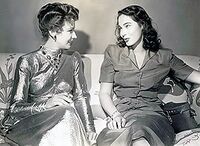Eija Nylund
Eija Nylund | |
|---|---|
 | |
| Born | 1 April 1923 |
| Died | 18 October 2010 (aged 87) Şenri, Envadra, Gylias |
| Nationality |
|
| Known for | First Director of the GNBS |
Eija Nylund (Gylic transcription: Eiá Nylun; 1 April 1923 – 18 October 2010) was an Alemarri–Gylian author, journalist, and television executive. She was the first Director of the Gylian National Broadcasting Service, from 1958 to 1990. She was crucial to establishing GNBS as a public broadcaster with a significant media and pop cultural influence.
Early life
Eija was born on 1 April 1923 in Alemarr. She came from a noble family, but rebelled from an early age against the strictures of her education and her expected career as a lady-in-waiting. Her younger brother recalled her as "a moody middle child who didn't feel loved and instead tormented mother and father with her bluntness."
As she grew older, she developed an outer façade of refinement to better integrate into the Alemarran royal court. The contrast between the refined exterior and cunning undertow prompted Rin Tōsaka to remark, "Eija is the most yamato nadeshiko person I've ever seen who isn't Miranian."
Liberation War
Eija started a relationship with Eemeli Ruotsalainen, a People's Army volunteer. She fled home in 1943 and moved with Eemeli to the Free Territories. At her insistence, their first act on arrival was to go to the local communal assembly and obtain a marriage certificate.
She worked as a journalist during the Liberation War, and volunteered for the People's Army, where she performed various home front duties. During this period, she remarked herself for her skill at organising and coordination, and gradually transitioned from reporting to editorial roles.
She was impressed with the decentralised broadcasting networks that emerged in the Free Territories, particularly in radio and television, and became acquainted with the Freeman family through Eemeli's friendship with Thomas Freeman. She began working as a producer for radio and television in the 1950s, gaining valuable experience in the field.
Director of the GNBS
Eija was appointed Director of the Gylian National Broadcasting Service soon after it was established in 1958.
The early years of her tenure were dominated by building up the GNBS' resources and forging concord between its anarchist heritage and her more conventional approach. She helped assemble a workforce that reunited established figures who'd started their careers with the SRA or Free Territories and up-and-coming talents. Her two most trusted assistants were Estelle Parker and Cecilia Parker, simultaneously appointed Head of Programming of Gylian Television.
Eija played a role in shaping the GNBS' distinctive broadcasting style. She accepted the technical shortcomings of the National Obligation period, and later encouraged their retention as they gave an air of "charmingly enthusiastic amateurism". At the same time, she had a tendency to favour presenters with a refined or aristocratic-tinged image like hers, such as Cathy French, Wendy Elkin, Arlène François, Doortje Koelewijn, or Isabel Longstowe, and commissioned lavish orchestral theme music from Susan Shelley. In this way, she helped align the GNBS with the emerging ideal of socialised luxury.
The 1960s–1970s were a time of prosperity for the GNBS, which underwent significant expansion and consolidated its cultural influence during the Golden Revolution. Eija supported the introduction of spin quotas, eclectic programming practices, and use of subtitles as standard. Although she avoided splitting programming genres across different networks out of principle, she oversaw the creation of new radio and television channels, which provided more specialised content.
Eija was high-minded, idealistic, and rigorous as Director. She enjoyed congenial relations with the GNBS' workers, who practiced self-management, and close relations with broadcasting minister Louise Schneider and Arts Council chair Tomoko Tōsaka. She ran the GNBS in a very personalised manner, and consistently co-opted the Management Board through personal charm, giving her almost unquestioned authority. Tomoko remarked that "she aspired to be a sort of philosopher king of broadcasting", and largely won support by being restrained and "letting people get on with their work."
She was committed to high-quality and adventurous programming. Under her tenure, the GNBS developed a large ancillary organisation to handle this aspect, establishing publishing operations in books, magazines, and music recordings. She gained the nickname the "baroness of broadcasting" (French: grande dame d'radiodiffusion) for her resolute championship of public broadcasting, and strong disapproval of advertising, commercial broadcasting, prudishness, anti-intellectualism and elitism.
She remained Director of the GNBS throughout the wretched decade in order to protect its independence from pressure by the Aén Ďanez government. Following the end of the wretched decade, she stepped down from the post in 1990, ending a 32-year tenure, and was succeeded by Nauşa Felan.
Later life and death
Eija left the spotlight and led a largely quiet retirement. She worked as an author, primarily of children's literature, and translated Alemarran folk songs and poetry into English and French.
She died of pneumonia on 18 October 2010 at a hospital in Şenri.
Private life
She was married to Eemeli Ruotsalainen until his death in 2000. They had one child.
She kept her religious beliefs private but was described by colleagues as intensely spiritual.
